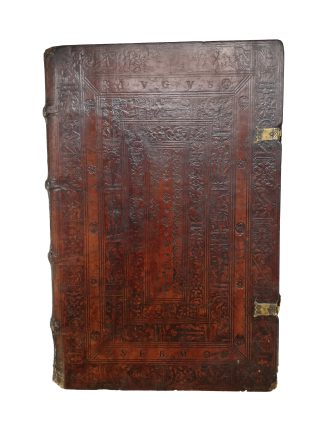AUGUSTINE OF HIPPO.
SPLENDID CONTEMPORARY BINDING
Preclarissima Divi Aurelii Augustini Sermonu[m] opera […]
Hagenau, Heinrich Gran for Johann Rynmann, 1521£4,250.00
Folio, ff. (l) 461 (v). Gothic letter, double column. Title in red and black within woodcut architectural border including printer’s device and arms of Hagenau with cherubs, grotesques and foliage. Woodcut floriated initials, occasional early marginalia. Uniform light age yellowing, t-p a little soiled, small hole in outer blank margin. Marginal finger soiling, small oil stain to upper margins of a few ll., bookmarks removed leaving a hole at fore edge of 8 ll., one red and gold silk marker partially remaining, small tears to outer edges of a very few ll. not affecting text. A good, clean and well margined copy in contemporary calf over wooden boards, minor loss at corners. Upper cover triple blind ruled to a panel design, first border roll-tooled with images of Charles V, Ferdinand I (Holy Roman Emperors) and Ludwig II (Count Palatine) and foliage, second border with alternating flower and little bell stamps, author and title, third border with images of the Crucifixion (‘satisfactio’), Resurrection (‘iustificatio’), Fall of Man (‘peccatum’), fourth border with Chloe, Venus and foliage, central panel with roll of delicate scrolling leaves, flowers and asterisk stamps. Lower cover with a similar design, blind stamped angels and little bell tools in central panel. Spine with triple blind ruled raised bands, stamps with floral decoration in compartments, joints cracked but firm. Original decorated brass anchor plates, later leather clasps. Ms. ex libris ‘Sum Ioannis Modreuii et amicorum suorum anno 1564’ and ‘Ecclesia Parrochialis Expensis’ on t-p, contemporary ms. annotations highlighting specific contents of the book and respective pages to pastedowns and fly, autograph of the Swiss librarian Dr. Karl Jakob Lüthi (1876–1958) and unidentified hexagonal stamp on front paste down.
A rare and splendidly bound copy of this collection of sermons by St. Augustine. This particular edition is the result of a collaboration between two German pioneers of early printing. Heinrich Gran is one of the first printers in Alsace, who established the first printing house in Hagenau. The majority of the works he produced during the first three decades of the XVI century are theological, and the present volume is a remarkable example. During this period, the publisher Johann Rynmann of Augsburg was one of his major clients, financing 174 out of 213 works released by the press. Considered to be the first non-printing publisher in history, Rynmann used to commission the production of books by others, to focus on their distribution. The handsomely decorated binding has been realised by an unidentified German bookbinder. The blind tooled motifs depicting Holy Roman Emperors, religious scenes and muses were quite popular during the XVI century in Germany, and very similar examples were in use in Munich, not far from Augsburg where Rynmann was based (see for example: Muses EBDB 132934m; religious roll 132577m).
Augustine of Hippo, commonly known as St. Augustine, is one of the most important Church Fathers of the Patristic period and among the most prolific Latin authors. His major writings – especially De Civitate Dei and Confessiones – are milestones of Western thought which had a fundamental influence on the subsequent development of the theological and philosophical disciplines. There exist between 400 and 500 sermons by Augustine, most of which were taken down by scribes as he preached so that written copies could be available to those who could not attend. Faithful to what Augustine actually said, the sermons reveal Augustine’s use of the so called ‘sermo humilis’ (‘humble speech’), that is a new and simplified style of language that could make the complex content of the Scriptures accessible to common people. Conversely to the scholarly style of his major works, the sermons allow us to appreciate the playfulness in Augustine’s choice of Latin puns. This edition, in addition to the sermons, also includes two exegetical works: In epistolam canonicam beati Ioannis’ and ‘In evangelium Ioannis’.
‘Ioannis Modrevius’ is probably the Polish ‘Jan Modrzewski’. Unfortunately, it has been impossible to identify him with certainty. Interestingly, however, he shares the surname of the important Polish Renaissance scholar, humanist and theologian Andrzej Frycz Modrzewski (1503-1572). Considered the “father of Polish democracy”, Modrzewski graduated in Krakow and then completed his studies of theology in Germany, where he met the reformers Martin Luther and Philip Melanchton. He travelled to France (where this book was printed) and Switzerland. Abroad, following the orders of his protector and reformer Jan Łaski (1499-1560), he bought the library of Erasmus and transported it to Poland.
A beautiful and rare copy, only two examples are recorded at auction in the last 50 years.
USTC 686385; VD16 A 4236; not in Adams, Graesse, BM STC Fr. and Ger.In stock







